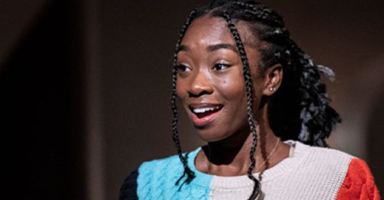By Micha Green
It’s not very often that by the end of a play, there are empty theatre seats, audience members out of place and no clear curtain call for actors to take their bows. Yet that’s exactly what happened when the house lights came on at Woolly Mammoth’s version of Jackie Sibblies Drury’s 2019 Pulitzer winning play “Fairview.”
After an hour and 40 minutes, those theatrical oddities weren’t the only thing left in a state of inquiry about race and how it is perceived.
Directed by Stevie Walker-Webb, “Fairview,” first seems to be a play inspired by Black sitcoms. Theater goers can expect to be entertained by a medley of intro songs celebrating Black sitcoms including, “Different Strokes,” “Good Times,” “One on One” and “That’s So Raven.”
The production opens to a classic TV sitcom set. The picture-perfect Black family feel is heightened, with a large family photo at the center of the neat home, showcasing a grandmother, mother, father, and young daughter. Beverly (Nikki Crawford), dressed in an ensemble inspired by a 50s housewife (although set in modern-day), prepares food for her mother’s birthday party, and jamming to Aretha Franklin’s “Rock Steady,” on a record player.
Despite the brightly lit, sparkling home, audiences quickly learn that nothing is perfect. “Rock Steady,” begins to skip on the record player, Beverly’s husband, Dayton (Samuel Ray Gates), leaves his beer out, which she is then forced to chug down and hide in a plant. Her pompous sister Jasmine (Shannon Dorsey) has just arrived adding an apparent level of anxiety and tension in the house.
Her high-energy, well-mannered daughter Keisha (Chinna Palmer) is tackling issues of her own.
Director Walker-Webb allowed the actors, even in their exaggerated caricatures to be human with real desires and goals. The actors fully live in their truth, even in this sitcom style of storytelling and express moments of pure joy, disappointment, excitement and love. Yet even in their realities, perception becomes the name of the game.
Jasmine, played by Dorsey, mockingly challenges the idea of a “family drama.” With the character written somewhat hyperbolic, Dorsey commands the stage when she compares her family’s life to a Black family drama, with storylines like “Soul Food,” or “Raisin in the Sun,” garnering uncomfortable, but honest laughs from the audience.
Is it a Black show without struggle?
Racial storylines and perceptions are further challenged when a voiceover of all-White actors, debate about which race they’d choose to be. Racist assertions are made about Latinx people, Asian families and African Americans. Offensive accents are heard, and generalizations are made.
The stereotypes discussed come to the forefront of the action when the White voiceover actors (Cody Nickell, Kimberly Hilbert, Christopher Dinolfo and Laura C. Harris) implicate themselves into the family action– one of them quite literally destroying the family unit when bursting from the family photo at the center of the set.
These White actors, through costumes, dialects and character choices- that are pretty much everything but direct Blackface- immediately tackle the perception of Black people in media, by embodying these stereotypes. Pretending to be members of the Black family, the White actors sabotage the dinner, ruin the house and create dramatic tales that leaves the family completely broken. In the final moments of this disruption, all the Black actors are left with white foods (cake icing and mashed potatoes) on their faces- quite literally performing in Whiteface and wholly hurt because of the White gaze.
The upsetting crescendo is stopped when Keisha delivers her final monologue about what she’d like to say to White people, and how she’d like her story to be told in a “fair” way. Palmer’s portrayal of Keisha leaves the teen shattered and audiences questioning their role in wrecking the young girl.
There’s no clear end, or happy curtain call where audiences remember, “it’s just a play.” The house lights are on and audiences can leave- but barely anyone leaves comfortably. People leave questioning. People leave re-evaluating.
Fairview exposes “the societal racism that divides us in hopes of bringing us closer together, and galvanizing us to take action against it,” Woolly Mammoth Maria Manuela Goyanes wrote in the play’s program.
With potentially wounding experiences for audience members, either White and people of color, Woolly Mammoth allows for healing dialogue after the play. Separating audience members by White and BIPOC (Black, Indigenous, People of Color) folks, audiences are afforded a moment to debrief the play and their feelings around it. Some leave empowered and tasked with the job of continuing important race conversations. On Friday, Sept. 20, some left still broken.

